Ho Chi Minh City urged to explore financial hub options
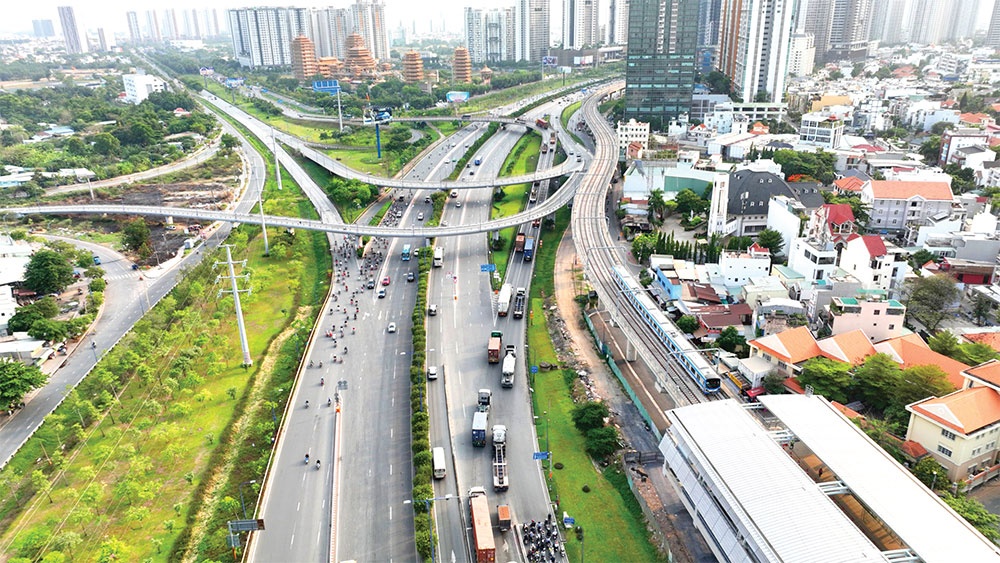 |
| Ho Chi Minh City has aspirations to develop on par with the likes of Bangkok and Singapore in terms of being a financial hub Photo: Le Toan |
At a National Assembly (NA) meeting in late May, Minister of Planning and Investment Nguyen Chi Dung confirmed that studies on establishing financial centres in Ho Chi Minh City and Danang are underway, though transforming the former into an international financial centre (IFC) will be no easy feat.
He acknowledged the complexity of the task, stating that the city was still grappling with defining the concept, scope, resources, model, and necessary conditions.
The Ministry of Planning and Investment will conduct in-depth research and report to the NA in due course, while Minister Dung also supported the inclusion of the IFC agenda in the current draft resolution.
The notion of transforming Ho Chi Minh City into an IFC was initially proposed two decades ago, but has remained on paper ever since. But while the city’s plan for this decade has laid out guidelines for establishing special mechanisms to develop the city as an IFC, NA Chairman Vuong Dinh Hue has suggested that a separate plan be developed, rather than incorporating it into the current draft resolution on special mechanisms.
Hue discussed two approaches to building such a centre, questioning whether Ho Chi Minh City should be developed as a complete financial hub or if it should host a distinct financial centre within its boundaries.
Leveraging advantages
Ho Chi Minh City’s proposed IFC model consists of three key components: the currency market and banking system, the capital market, and the derivatives market.
To realise this vision, the city has formulated four action programmes: developing fintech, digital banking, and financial transactions; integrating the region into the financial centre; developing the financial and commercial district of Thu Thiem; and expanding the commodity market. These programmes include proposals such as establishing independent digital banks and creating a derivatives trading exchange.
In addition to financial services, the envisioned IFC aims to include entertainment facilities and casinos, with a focus on attracting investors. The city has outlined a three-stage roadmap to complete the development of the international financial centre by 2030.
Dr. Phung Huong Giang, a lecturer and researcher at the ISC Business School in Paris, emphasised at last week’s conference on building Ho Chi Minh City’s financial centre that given the intense competition from well-established and reputable financial institutions with a track record of quality service, it would not be a walk in the park.
“Vietnam should explore global demand for niche markets or alternatives to establish itself as an IFC,” she said.
Giang identified several fundamental factors that determine the ranking of an IFC, including the economic strength of the host country, national governance and business environment, comprehensive financial development, a skilled labour force, access to infrastructure, and national reputation. The city still lacks several critical elements, particularly in terms of infrastructure.
Tran Nhat Khanh, managing partner of Touchstone Partners, highlighted the legal risks faced by startups, particularly in areas of convergence such as educational, agricultural, and healthcare technology. To overcome these challenges, he suggested the establishment of a sandbox to stimulate innovation and creativity.
Furthermore, innovative startups should benefit from exemptions or reductions in personal income tax (PIT) for specialised professionals.
“An AI scientist earning $500,000-700,000 annually in the US would only receive approximately half that in Vietnam, with an additional 35 per cent deducted as PIT,” Khanh noted. “Singapore, on the other hand, makes government investments in venture capital and private equity funds. The city could explore cash investments, tax incentives, and other measures to provide assistance to startup ventures.”
Meanwhile, the growth of the domestic stock market stands as a critical factor in transforming the city into an IFC. In light of this, Nguyen The Minh, research director at Yuanta Securities, proposed the elevation of listing standards for traded commodities.
At present, the Ho Chi Minh Stock Exchange imposes stricter listing requirements compared to the other two exchanges, yet there remains a proliferation of “junk stocks” listed. Thus, a filtering process, enhanced transparency, and the application of international accounting standards should be implemented for companies debuting on the exchange.
“To attract foreign capital, mechanisms should be established to facilitate swift securities account opening for foreign investors. Foreign ownership restrictions should also be addressed promptly by introducing non-voting depository receipts, allowing foreign investors to acquire shares and have shareholder rights without voting privileges,” Minh said.
Moreover, the city requires specific mechanisms to facilitate the equitisation and divestment processes of state-owned enterprises. Additionally, better conditions should be created for large-scale foreign-invested enterprises with an A-rated credit to be listed on the Vietnamese stock exchange.
Seeking cross-border cooperation
Dr. Nguyen Huu Huan, finance head at the Ho Chi Minh City University of Economics, said that the city possesses several exceptional factors that can contribute to its development as an IFC.
“For instance, Singapore’s corporate income tax rate stands at 17 per cent excluding startup incentives. Meanwhile, it is 20 per cent in Vietnam, indicating a relatively minor disparity that could be further diminished through tax reductions. The cost of establishing a business in Vietnam amounts to approximately $2,000, in stark contrast to over $5,000 in Singapore,” Huan said.
Additionally, in Singapore, appointing a resident as a director when starting a business incurs additional costs. On the other hand, Vietnam offers a more cost-effective option, with business maintenance expenses ranging $2,000-3,000, while in Singapore, they can be as high as $20,000.
Vietnam aspires to capitalise on abundant collaborative opportunities offered by other global powerhouses to establish itself as an eminent IFC.
Vietnam’s State Vice President Vo Thi Anh Xuan on May 7 engaged in deliberations with Qatar’s Deputy Emir Abdullah Bin Hamad Al Thani, underscoring the untapped potential for mutual synergy in commerce, investment, tourism, and particularly in building an IFC.
Earlier last month, Vietnam’s Ministry of Finance and Luxembourg consummated a landmark strategic financial partnership agreement, heralding a novel paradigm of cooperation between the two nations after a five-decade diplomatic establishment.
The crux of this accord centres around Luxembourg imparting its invaluable expertise to assist Vietnam in erecting a formidable financial stronghold. The two parties resolved to implement the partnership between the Vietnam and Luxembourg stock exchanges, whilst intensifying collaborative efforts in the banking arena and harnessing Luxembourg’s financial resources to bolster Vietnam’s pursuit of the Green Growth Strategy for 2021-2030 and beyond.
Elsewhere, Dr. Patrick Lau, deputy executive director of the Hong Kong Trade Development Council, said that more cooperation should be strengthened across Asia, including building a suitable financial centre.
“Vietnamese businesses, as well as other ASEAN eligible companies, can utilise Hong Kong more, such as in dual-listing here, as a way to hedge risk and tap into the wider pool of international investors. There’s no certain recipe for success to developing an IFC, but different countries could have their own advantages to boost their attractiveness as a new-model IFC, such as be being a hub for growth-stage fintech or venture capital funds,” Lau told VIR.
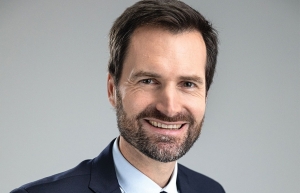 | Hanoi and Ho Chi Minh City now on the Michelin map As some restaurants in Vietnam were awarded Michelin stars for the first time, high hopes are set for the country’s food and restaurant scene. Gwendal Poullennec, international director of the Michelin Guide, talked to VIR’s Linh Dan about the selection criteria and Michelin’s positive outlook for Vietnam’s culinary landscape. |
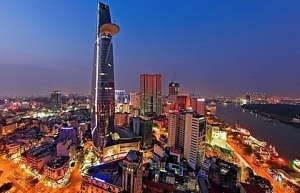 | HCM City seeks to become global financial hub HCM City has committed to develop a detailed plan to turn the city into a regional and international financial hub after years of delay in carrying out the ambitious goal. |
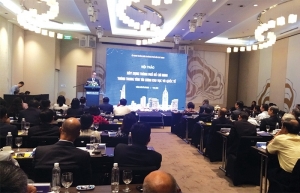 | Building a financial hub for Vietnam Ho Chi Minh City People’s Committee is resuming its mega-plan to turn the city into an international financial hub after last year’s disbandment of the $900 million Berjaya Vietnam Financial Centre. |
 | HCM City aims to become international financial hub The People’s Committee of Ho Chi Minh City has asked for the Government’s support of its scheme to make the city a regional and international financial hub. |
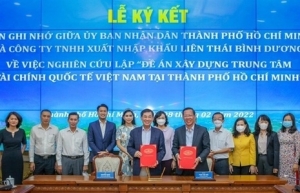 | HCM City joins hands with IPP Group to develop international financial hub The HCM City People’s Committee has signed a memorandum of understanding with the Imex Pan Pacific Group for a feasibility study for building the Viet Nam International Financial Hub. |
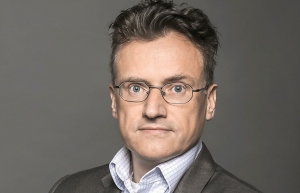 | Vietnam rising as a global financial hub: why not? For many observers, Vietnam becoming a true financial hub seems an unrealistic vision. But why shouldn’t a bustling business metropolis like Ho Chi Minh City be able to develop into an international financial centre? |
What the stars mean:
★ Poor ★ ★ Promising ★★★ Good ★★★★ Very good ★★★★★ Exceptional
Related Contents
Latest News
More News
- Kurz Vietnam expands Gia Lai factory (February 27, 2026 | 16:37)
- SK Innovation-led consortium wins $2.3 billion LNG project in Nghe An (February 25, 2026 | 07:56)
- THACO opens $70 million manufacturing complex in Danang (February 25, 2026 | 07:54)
- Phu Quoc International Airport expansion approved to meet rising demand (February 24, 2026 | 10:00)
- Bac Giang International Logistics Centre faces land clearance barrier (February 24, 2026 | 08:00)
- Bright prospects abound in European investment (February 19, 2026 | 20:27)
- Internal strengths attest to commitment to progress (February 19, 2026 | 20:13)
- Vietnam, New Zealand seek level-up in ties (February 19, 2026 | 18:06)
- Untapped potential in relations with Indonesia (February 19, 2026 | 17:56)
- German strengths match Vietnamese aspirations (February 19, 2026 | 17:40)

 Tag:
Tag:



















 Mobile Version
Mobile Version